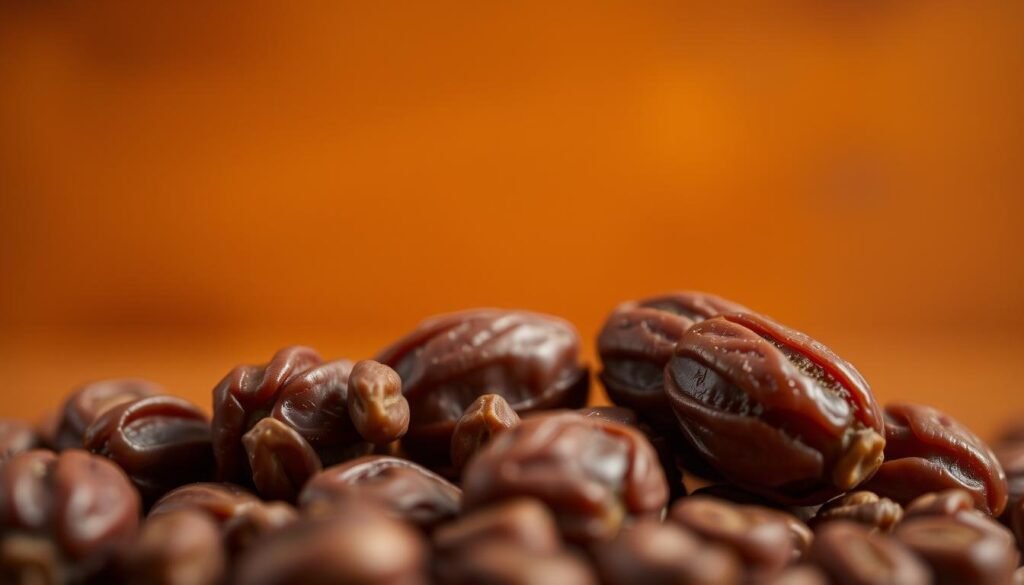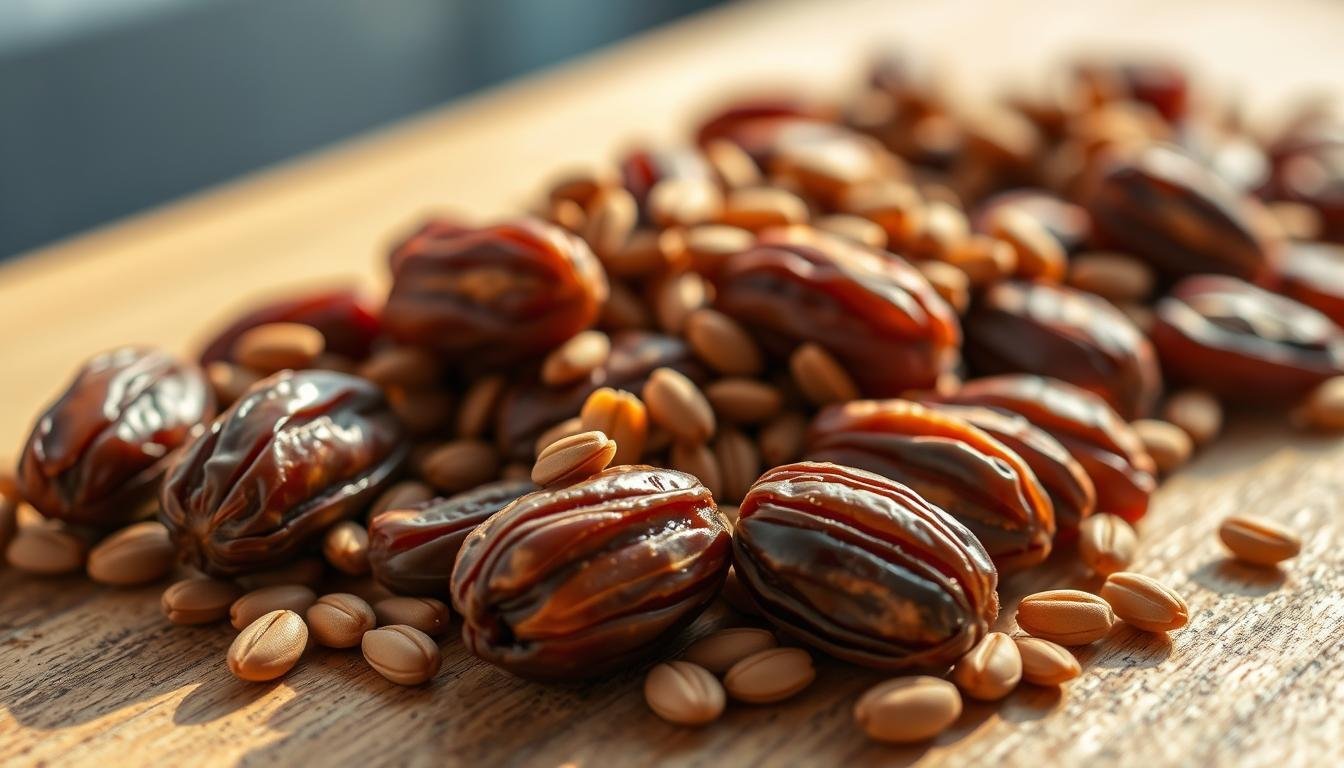Last updated on August 23rd, 2025 at 11:28 am
Can You Eat the Seeds of Dates? Ever thought about eating date seeds? Dates are common in many dishes, but we usually toss the seeds. Yet, date seeds are packed with nutrients, making them worth a closer look.
Let’s dive into the world of date seeds. You’ll learn about their health benefits and how they can be part of your meals. They’re full of fiber, antioxidants, and more, making them interesting for those who want to eat healthier and waste less food.
This article will cover if date seeds are safe to eat, their nutritional value, and how to add them to your diet. We aim to give you a full picture of these often ignored date seeds.
Contents
- 1 What Are Date Seeds?
- 2 Can You Eat the Seeds of Dates?
- 3 Nutritional Profile of Date Seeds
- 4 Potential Health Benefits of Date Seeds
- 5 Research Limitations and Future Studies
- 6 How to Prepare and Consume Date Seeds
- 7 Precautions and Considerations
- 8 Embracing Date Seeds for a Healthier You
- 9 FAQ: Can You Eat the Seeds of Dates?
- 9.1 Are date seeds safe to eat?
- 9.2 How do I prepare date seeds for consumption?
- 9.3 What are the health benefits of consuming date seeds?
- 9.4 Can date seeds cause allergic reactions?
- 9.5 How should I store date seeds?
- 9.6 Can date seeds interact with medications?
- 9.7 Are date seeds a significant source of nutrition?
What Are Date Seeds?
Date seeds are the pits or stones found at the center of dates. These are the sweet and nutritious fruits enjoyed all over the world. People usually remove these seeds before eating the date fruit.
Date seeds have been a part of many cultures for centuries. They are often thrown away after eating the fruit. But, they have been used in traditional medicine and as animal feed in some places.
The composition of date seeds includes a hard, woody exterior. This outer layer covers a kernel that is rich in nutrients. The kernel has been studied for its potential health benefits.
| Component | Description | Nutritional Value |
|---|---|---|
| Hard Exterior | Woody outer layer | Low |
| Kernel | Inner seed content | High in fiber, antioxidants |
Eating date seeds or using their extracts has been explored for health benefits. These include antioxidant properties and potential anti-inflammatory effects.
Can You Eat the Seeds of Dates?
Many people wonder if they can eat date seeds. The answer is yes, you can. Date seeds are not only edible but also a good source of nutrition. However, they need to be prepared correctly before you can eat them.
Eating date seeds can be good for you because they are nutritious. But, it’s important to prepare them right to avoid any bad effects. Roasting or grinding them is a common way to make them taste better and safer to eat.
| Preparation Method | Description | Benefits |
|---|---|---|
| Roasting | Roasting date seeds can enhance their flavor. | Improves digestibility and taste. |
| Grinding | Grinding the seeds into a powder. | Easier to incorporate into various dishes. |
| Boiling | Boiling can be used to soften the seeds. | Can make the seeds more palatable. |
When you start eating date seeds, begin with a small amount. This helps you see how your body reacts. Remember, trying new foods can sometimes cause allergic reactions or stomach issues.
Nutritional Profile of Date Seeds
Date seeds are a treasure trove of essential nutrients. They are loaded with fiber, antioxidants, and other vital nutrients. These nutrients are key to maintaining good health. Adding date seeds to your meals can greatly benefit your diet.
Date seeds are a powerhouse of dietary fiber. This fiber is great for your digestive health and helps keep blood sugar levels stable. They also contain antioxidants, which protect cells from damage caused by harmful free radicals.
| Nutrient | Amount per 100g | Benefit |
|---|---|---|
| Dietary Fiber | 60-80g | Promotes digestive health |
| Antioxidants | Varies | Protects cells from damage |
| Protein | 5-7g | Supports muscle health |
Thenutritional profile of date seedsshows they are good for your overall health. By adding date seeds to your meals, you can enjoy their many health benefits. This can improve your health in many ways.
Potential Health Benefits of Date Seeds
Adding date seeds to your diet can boost your health. They are packed with antioxidants, fiber, and minerals. These can help with digestion, increase antioxidant intake, and even fight inflammation.
Date seeds are full of dietary fiber. This fiber helps keep your digestive system healthy by preventing constipation. It also supports the growth of good gut bacteria. The antioxidants in date seeds, like flavonoids and phenolic acids, protect cells from damage.
Eating date seeds might also reduce inflammation. This is thanks to their polyphenols and other bioactive compounds. These substances can help lower the risk of chronic diseases by reducing inflammation in the body.
Research Limitations and Future Studies
While research on date seeds looks good, there are some limits. Most studies were done in labs or on animals. More research on humans is needed to fully understand their benefits.
| Potential Health Benefit | Current Research Status | Future Research Directions |
|---|---|---|
| Improved Digestion | In vitro and animal studies show promise | Human clinical trials to confirm efficacy |
| Antioxidant Intake | Rich in antioxidants; in vitro studies | Clinical trials to assess bioavailability and effects |
| Anti-inflammatory Effects | Animal studies indicate potential benefits | Human trials to evaluate anti-inflammatory effects |
The table above summarizes the current research status and future directions for studying the health benefits of date seeds.
How to Prepare and Consume Date Seeds
Preparing date seeds is easy and can boost your diet. Learning simple ways to prepare them can unlock their nutritional benefits.
To begin, roast the seeds to enhance their taste. Spread them on a baking sheet and roast at a low oven temperature until they’re lightly browned. Or, grind them into a powder with a coffee grinder or blender. This powder is great in smoothies, baked goods, or as a supplement.
It’s important to store date seeds properly to keep them fresh. Keep them in an airtight container in a cool, dry place. Roasted seeds can last up to six months, while ground seeds should be used within a few weeks.
For ground seeds, refrigeration can help them last longer. Always check for spoilage signs like bad smells or mold before eating.
Precautions and Considerations
When you eat date seeds, it’s important to know some safety tips. Make sure you watch out for allergic reactions. Some people might have an allergic response to date seeds.
Also, date seeds could affect how some medicines work. Always talk to a doctor before adding them to your meals. This is especially true if you’re on any medications or have health issues.

To stay safe, clean, roast, and grind date seeds right. Doing this can lower the chance of bad reactions.
By following these safety steps, you can enjoy date seeds safely. They offer great nutrition and can be a healthy addition to your diet.
Embracing Date Seeds for a Healthier You
Date seeds are not only safe to eat but also full of good stuff. Adding them to your meals can boost your health. They help with digestion and are rich in antioxidants.
It’s easy to get date seeds ready for eating. Just roast or grind them. Next time you have dates, save the seeds for extra nutrition.
Choosing the right foods is key to staying healthy. So, yes, you can eat date seeds. They’re a smart choice for better nutrition.
See Also: Can You Eat the Seeds of Granadilla?
FAQ: Can You Eat the Seeds of Dates?
Are date seeds safe to eat?
Yes, date seeds are safe to eat if you prepare them right. You need to roast or grind them to unlock their nutrients.
How do I prepare date seeds for consumption?
To get date seeds ready, roast them in the oven or grind them into a powder. Use a coffee grinder or food processor. Roasting makes them taste better and easier to grind.
What are the health benefits of consuming date seeds?
Date seeds are packed with fiber, antioxidants, and other nutrients. They help with digestion, boost antioxidants, and support overall health.
Can date seeds cause allergic reactions?
Yes, allergic reactions to date seeds are possible. If you get itching, swelling, or trouble breathing after eating them, get help right away.
How should I store date seeds?
Keep date seeds fresh by storing them in an airtight container. Place it in a cool, dry spot, away from sunlight.
Can date seeds interact with medications?
Date seeds might affect some medications, like blood thinners, because of their nutrients. Talk to a doctor before adding them to your diet if you’re on meds.
Are date seeds a significant source of nutrition?
Yes, date seeds are a great source of fiber, antioxidants, and other nutrients. They’re a healthy choice when part of a balanced diet.

Hello, I am Bellamy George, a certified nutritionist and food safety specialist from Springfield, IL. With a degree in Food Science, I share research-backed insights on edible foods, seeds, and seafood for safe, informed eating.

